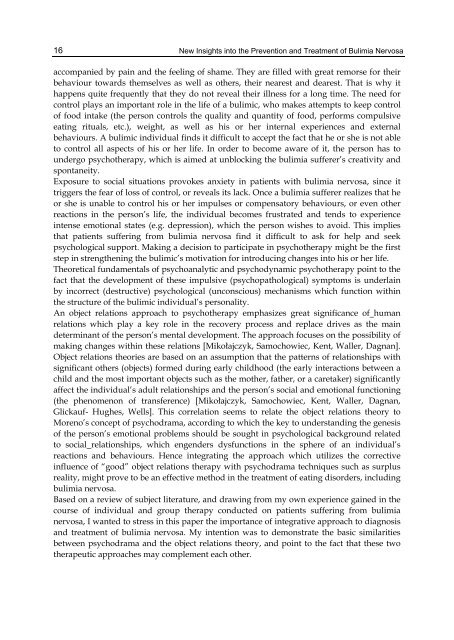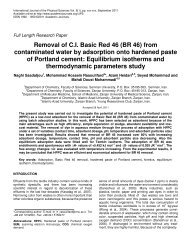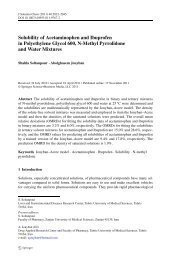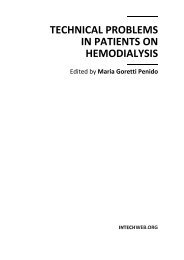new insights into the prevention and treatment of bulimia nervosa
new insights into the prevention and treatment of bulimia nervosa
new insights into the prevention and treatment of bulimia nervosa
You also want an ePaper? Increase the reach of your titles
YUMPU automatically turns print PDFs into web optimized ePapers that Google loves.
16<br />
New Insights <strong>into</strong> <strong>the</strong> Prevention <strong>and</strong> Treatment <strong>of</strong> Bulimia Nervosa<br />
accompanied by pain <strong>and</strong> <strong>the</strong> feeling <strong>of</strong> shame. They are filled with great remorse for <strong>the</strong>ir<br />
behaviour towards <strong>the</strong>mselves as well as o<strong>the</strong>rs, <strong>the</strong>ir nearest <strong>and</strong> dearest. That is why it<br />
happens quite frequently that <strong>the</strong>y do not reveal <strong>the</strong>ir illness for a long time. The need for<br />
control plays an important role in <strong>the</strong> life <strong>of</strong> a bulimic, who makes attempts to keep control<br />
<strong>of</strong> food intake (<strong>the</strong> person controls <strong>the</strong> quality <strong>and</strong> quantity <strong>of</strong> food, performs compulsive<br />
eating rituals, etc.), weight, as well as his or her internal experiences <strong>and</strong> external<br />
behaviours. A bulimic individual finds it difficult to accept <strong>the</strong> fact that he or she is not able<br />
to control all aspects <strong>of</strong> his or her life. In order to become aware <strong>of</strong> it, <strong>the</strong> person has to<br />
undergo psycho<strong>the</strong>rapy, which is aimed at unblocking <strong>the</strong> <strong>bulimia</strong> sufferer’s creativity <strong>and</strong><br />
spontaneity.<br />
Exposure to social situations provokes anxiety in patients with <strong>bulimia</strong> <strong>nervosa</strong>, since it<br />
triggers <strong>the</strong> fear <strong>of</strong> loss <strong>of</strong> control, or reveals its lack. Once a <strong>bulimia</strong> sufferer realizes that he<br />
or she is unable to control his or her impulses or compensatory behaviours, or even o<strong>the</strong>r<br />
reactions in <strong>the</strong> person’s life, <strong>the</strong> individual becomes frustrated <strong>and</strong> tends to experience<br />
intense emotional states (e.g. depression), which <strong>the</strong> person wishes to avoid. This implies<br />
that patients suffering from <strong>bulimia</strong> <strong>nervosa</strong> find it difficult to ask for help <strong>and</strong> seek<br />
psychological support. Making a decision to participate in psycho<strong>the</strong>rapy might be <strong>the</strong> first<br />
step in streng<strong>the</strong>ning <strong>the</strong> bulimic’s motivation for introducing changes <strong>into</strong> his or her life.<br />
Theoretical fundamentals <strong>of</strong> psychoanalytic <strong>and</strong> psychodynamic psycho<strong>the</strong>rapy point to <strong>the</strong><br />
fact that <strong>the</strong> development <strong>of</strong> <strong>the</strong>se impulsive (psychopathological) symptoms is underlain<br />
by incorrect (destructive) psychological (unconscious) mechanisms which function within<br />
<strong>the</strong> structure <strong>of</strong> <strong>the</strong> bulimic individual’s personality.<br />
An object relations approach to psycho<strong>the</strong>rapy emphasizes great significance <strong>of</strong> human<br />
relations which play a key role in <strong>the</strong> recovery process <strong>and</strong> replace drives as <strong>the</strong> main<br />
determinant <strong>of</strong> <strong>the</strong> person’s mental development. The approach focuses on <strong>the</strong> possibility <strong>of</strong><br />
making changes within <strong>the</strong>se relations [Mikołajczyk, Samochowiec, Kent, Waller, Dagnan].<br />
Object relations <strong>the</strong>ories are based on an assumption that <strong>the</strong> patterns <strong>of</strong> relationships with<br />
significant o<strong>the</strong>rs (objects) formed during early childhood (<strong>the</strong> early interactions between a<br />
child <strong>and</strong> <strong>the</strong> most important objects such as <strong>the</strong> mo<strong>the</strong>r, fa<strong>the</strong>r, or a caretaker) significantly<br />
affect <strong>the</strong> individual’s adult relationships <strong>and</strong> <strong>the</strong> person’s social <strong>and</strong> emotional functioning<br />
(<strong>the</strong> phenomenon <strong>of</strong> transference) [Mikołajczyk, Samochowiec, Kent, Waller, Dagnan,<br />
Glickauf- Hughes, Wells]. This correlation seems to relate <strong>the</strong> object relations <strong>the</strong>ory to<br />
Moreno’s concept <strong>of</strong> psychodrama, according to which <strong>the</strong> key to underst<strong>and</strong>ing <strong>the</strong> genesis<br />
<strong>of</strong> <strong>the</strong> person’s emotional problems should be sought in psychological background related<br />
to social relationships, which engenders dysfunctions in <strong>the</strong> sphere <strong>of</strong> an individual’s<br />
reactions <strong>and</strong> behaviours. Hence integrating <strong>the</strong> approach which utilizes <strong>the</strong> corrective<br />
influence <strong>of</strong> “good” object relations <strong>the</strong>rapy with psychodrama techniques such as surplus<br />
reality, might prove to be an effective method in <strong>the</strong> <strong>treatment</strong> <strong>of</strong> eating disorders, including<br />
<strong>bulimia</strong> <strong>nervosa</strong>.<br />
Based on a review <strong>of</strong> subject literature, <strong>and</strong> drawing from my own experience gained in <strong>the</strong><br />
course <strong>of</strong> individual <strong>and</strong> group <strong>the</strong>rapy conducted on patients suffering from <strong>bulimia</strong><br />
<strong>nervosa</strong>, I wanted to stress in this paper <strong>the</strong> importance <strong>of</strong> integrative approach to diagnosis<br />
<strong>and</strong> <strong>treatment</strong> <strong>of</strong> <strong>bulimia</strong> <strong>nervosa</strong>. My intention was to demonstrate <strong>the</strong> basic similarities<br />
between psychodrama <strong>and</strong> <strong>the</strong> object relations <strong>the</strong>ory, <strong>and</strong> point to <strong>the</strong> fact that <strong>the</strong>se two<br />
<strong>the</strong>rapeutic approaches may complement each o<strong>the</strong>r.














![focuspdca.ppt [Compatibility Mode]](https://img.yumpu.com/22859457/1/190x146/focuspdcappt-compatibility-mode.jpg?quality=85)


